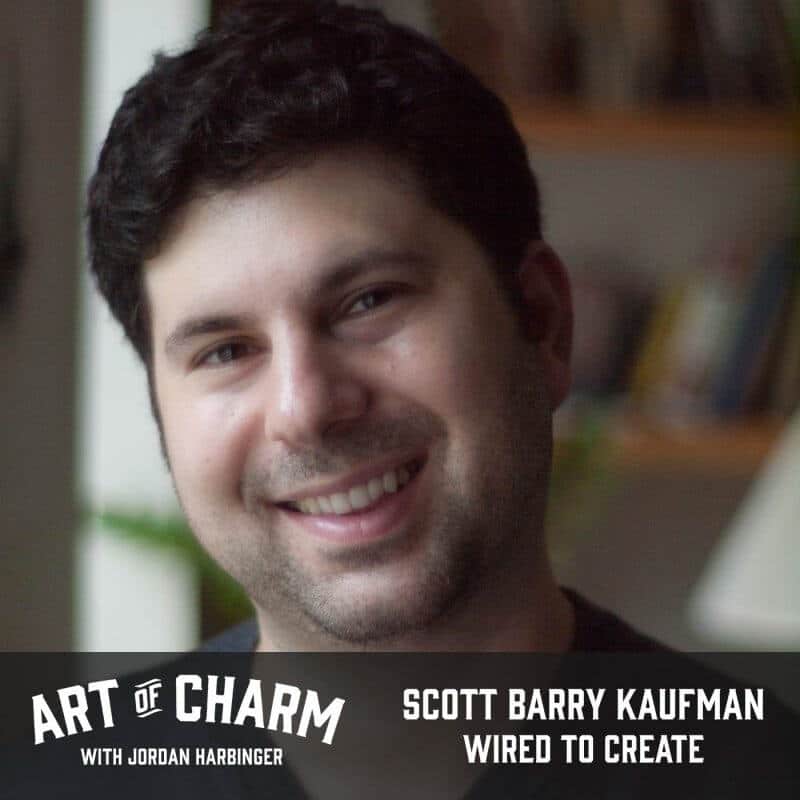Scott Barry Kaufman (@sbkaufman) believes in the power of imagination and creativity to transform society for the better. He’s the co-author of Wired to Create: Unraveling the Mysteries of the Creative Mind, which details the 10 habits of highly creative people.
“Openness to new experiences is the number one best predictor of creativity.” -Scott Barry Kaufman
The Cheat Sheet:
- What’s the difference between imagination and creativity?
- Learn how creative people have “messy” minds (and why this doesn’t mean what it sounds like it means).
- What is creative thinking?
- Openness to new experiences is the number one best predictor of creativity.
- Understand how adopting the Outsider’s Mindset — looking at your everyday experiences (such as work) as an outsider — can give you new and creative insights.
- And so much more…
[aoc-subscribe]
Do you consider yourself a creative person? According to Dr. Scott Barry Kaufman, our guest on episode 496 of The Art of Charm, creativity is an essential contributor to well-being, fulfillment, and self-expression in life — and there are ways to hone creativity and recognize it in things we do that might not seem obviously creative at first glance.
In his recent book (co-authored with Carolyn Gregoire) Wired to Create: Unraveling the Mysteries of the Creative Mind, Scott details the 10 habits of highly creative people and shares his insights with us on this program. Scott is currently the Scientific Director of the Imagination Institute in the Positive Psychology Center at the University of Pennsylvania, he writes the Beautiful Minds column at Scientific American, he hosts The Psychology Podcast, he’s the co-founder of The Creativity Post, and he’s also the author of Ungifted: Intelligence Redefined.
More About This Show
“I see imagination as being able to envision new worlds — new realities that don’t currently exist,” says Dr. Scott Barry Kaufman, co-author of Wired to Create: Unraveling the Mysteries of the Creative Mind. While he goes on to say it’s an important part of creativity, it’s not all there is to it. Creativity is how we apply our novel ideas to the task (or audience) at hand.
We may not consider ourselves creative because we don’t draw or paint or invent new things, but Scott points out that our creativity may express itself in other ways — like being a podcast host with the gift of gab and a penchant for absurd analogies, for instance. But some of us also hesitate to identify as “creative” because we associate it with pretentious, self-congratulatory people we’ve encountered in the past — like the stuck-up classmates who told you they were “gifted” in elementary school.
And while he’s a scientist, professor, author, and all-around smarty pants now, Scott will tell you he was considered anything but gifted when he was growing up. “I got beaten up for being considered stupid,” he says. “I think it’s a big part why I’m an advocate for creativity, though. Because, as a kid, what I certainly was was different — like an outsider sort of mindset. Being put in special ed does kind of give you this outsider’s mindset and I really did feel as though I wanted to challenge the system.”
He noted that a lot of the kids who were divided, alongside him, into special education with labels like ADHD and behavioral problems were actually very creative. He believes this instilled — from early on — a purpose to extoll the merits of creative thinkers. But what is creativity?
“We define it as something that is novel and useful, so it has those characteristics,” says Scott. “But it isn’t like pornography [where you know it when you see it]. I don’t know if you know it when you see it, but you know when someone is being really zany — and that’s not necessarily creative. If someone’s just hallucinating, like a schizophrenic patient, we don’t tend to say that’s creative.” But bringing something original into being that never existed before and having it make sense for yourself or others is about as close as we get to defining it. But studying this elusive quality in a laboratory produces more concrete, quantifiable results.
“We don’t just use one measure,” Scott says. “We try to coordinate lots of different measures and see if they all agree with each other — and we do find they do agree with each other to a large extent. So people who say that creativity is a central part of their identity also tend to be higher creative achievers; they tend to be higher in tests of divergent thinking.”
How do you know if you’re a divergent thinker? Scott invites us to consider this: if people could become invisible at will, name three implications — off the top of your head — how they would utilize this power. If you’re like Jordan (who, for the record, doesn’t consider himself very creative), you might be able to rapidly rattle off more than three, and you might even recognize that the answers you give today are probably radically different than answers you may have given in another stage of life.
Listen to this episode of The Art of Charm to learn more about what science tells us about creativity, why a lot of creative thinkers have “messy” minds (and what this really means versus what it sounds like), why being open to new experiences is the number one predictor for creativity, how dopamine pathways differ between people who are primarily creative and those who aren’t, what role the unconscious mind plays in creativity, how we can adapt our habits to become more creative, and lots more.
THANKS, SCOTT BARRY KAUFMAN!
Resources from this episode:
- Wired to Create: Unraveling the Mysteries of the Creative Mind by Scott Barry Kaufman and Carolyn Gregoire
- Other books by Scott Barry Kaufman
- The Psychology Podcast
- Beautiful Minds at Scientific American
- The Creativity Post
You’ll also like:
On your phone? Click here to write us a well-deserved iTunes review and help us outrank the riffraff!




